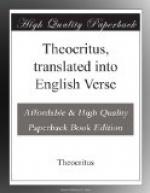IDYLL XII.
The Comrades
Thou art come, lad, come!
Scarce thrice hath dusk to day
Given place—but
lovers in an hour grow gray.
As spring’s more sweet
than winter, grapes than thorns,
The ewe’s fleece richer
than her latest-born’s;
As young girls’ charms
the thrice-wed wife’s outshine,
As fawns are lither than the
ungainly kine,
Or as the nightingale’s
clear notes outvie
The mingled music of all birds
that fly;
So at thy coming passing glad
was I.
I ran to greet thee e’en
as pilgrims run
To beechen shadows from the
scorching sun:
Oh if on us accordant Loves
would breathe,
And our two names to future
years bequeath!
’These twain’—let
men say—’lived in olden days.
This was a yokel (in
their country-phrase),
That was his mate (so
talked these simple folk):
And lovingly they bore a mutual
yoke.
The hearts of men were made
of sterling gold,
When troth met troth, in those
brave days of old,’
O Zeus, O gods
who age not nor decay!
Let e’en two hundred
ages roll away,
But at the last these tidings
let me learn,
Borne o’er the fatal
pool whence none return:—
“By every tongue thy
constancy is sung,
Thine and thy favourite’s—chiefly
by the young.”
But lo, the future is in heaven’s
high hand:
Meanwhile thy graces all my
praise demand,
Not false lip-praise, not
idly bubbling froth—
For though thy wrath be kindled,
e’en thy wrath
Hath no sting in it:
doubly I am caressed,
And go my way repaid with
interest.
Oarsmen of Megara,
ruled by Nisus erst!
Yours be all bliss, because
ye honoured first
That true child-lover, Attic
Diocles.
Around his gravestone with
the first spring-breeze
Flock the bairns all, to win
the kissing-prize:
And whoso sweetliest lip to
lip applies
Goes crown-clad home to its
mother. Blest is he
Who in such strife is named
the referee:
To brightfaced Ganymede full
oft he’ll cry
To lend his lip the potencies
that lie
Within that stone with which
the usurers
Detect base metal, and which
never errs.
IDYLL XIII.
Hylas.
Not for us only, Nicias, (vain
the dream,)
Sprung from what
god soe’er, was Eros born:
Not to us only grace doth
graceful seem,
Frail things who
wot not of the coming morn.
No—for Amphitryon’s
iron-hearted son,
Who braved the lion, was the
slave of one:—
A fair curled creature, Hylas
was his name.
He taught him,
as a father might his child,
All songs whereby himself
had risen to fame;
Nor ever from
his side would be beguiled
When noon was high, nor when
white steeds convey
Back to heaven’s gates
the chariot of the day,




